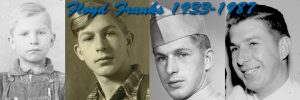Carefree days of youth
I opened the door and the thickly painted white screen door slammed behind me. I seldom noticed the sound it made as I bounded down the three steps from our front stoop. Once down on the sidewalk, I was hidden from the street behind the huge green box hedges fronted by azaleas.
Once I was big enough to roam outside on my own, this is how most summer days began. Once I hit the sidewalk, I was making my way around to the utility room to pull out my green bike to open up the doors of freedom. Sometimes, my mom would be standing there by the washing machine loading in clothes she would later take out and hang on the line for drying.
As I stepped up on the pedals and rested myself on the banana seat, from behind me, I would hear, “Be back by lunch. We are going to town for ‘looking and feeling’ this afternoon.”
“Yes, ma’am,” I replied as I gained speed going down the driveway and turned to the left headed for adventure.
You might ask what is ‘looking and feeling?’ That is what ladies from our area called shopping when they were aiming to get out and not buy but enjoy the air conditioning in the stores in the hot summer months.
We did a lot of that which could seem to be a terminal situation when you had something else on your mind to do as a kid.
But for the morning, I was off to create some adventure, so, my first stop would be banging on a couple of doors to raise some other kids to play. Before you could say Hank Aaron, there would be about five or six of us on our bikes riding down suicide hill.
Soon we would move on to the woods where we had built a series of forts fully stocked with pinecones.
We would pick sides, and we were battling the other team to ensure the survival of our clan over the other. Sometimes we were Yankees and Confederates, sometimes Cowboys and Indians, sometimes Germans and Americans, British and Colonists, it really depended upon what movie we recently saw or what history lesson was near at hand.
Either way, and no matter who we were representing, the battles took form until we ran out of ammunition and the other team overran our stronghold. We would then restock the forts for the next battle day. Then we would be off for maybe wading in the creek and then back home in time for lunch.
Usually, a bologna sandwich with a slice of tomato from the garden, a wedge of cucumber, some barbeque Charlie’s Chips and a big glass of cherry Kool-Aid. Then I would go wash off, change from my play clothes and be ready to climb into the passenger side of our Chevy Malibu to head to the stores.
Often, I would be moved to the back seat if we picked up another mom and kids. The children were sent to the back seat, and we made our way to Woolworths, J.C. Penney, Sears or even Rich’s. Of course, in those days there were no special youth seats. We didn’t even use the seat belts. We sat still though, or we would feel the long arm of the law from the ladies in the front seat.
We were expected to behave no matter how many hours the excursion was. Especially when we were in public — in the stores. If we ever forgot ourselves (which I did on a couple of occasions and turned the women’s and men’s department into a playground and the underneath areas of the hanging clothes and good places with hide and seek with whichever other kids were on the outing), we soon felt the sting of our mistakes upon our posteriors, and it would come sooner than later if we disturbed other folks.
As I hear kids screaming at their parents and see them acting out in public today, I fondly remember the tough lessons my parents gave me. I remember those days of imagination, and the hours of fun, and I wish that children today could have those experiences, rather than a childhood attached to screens of various types and parents who look the other way when they act out.



